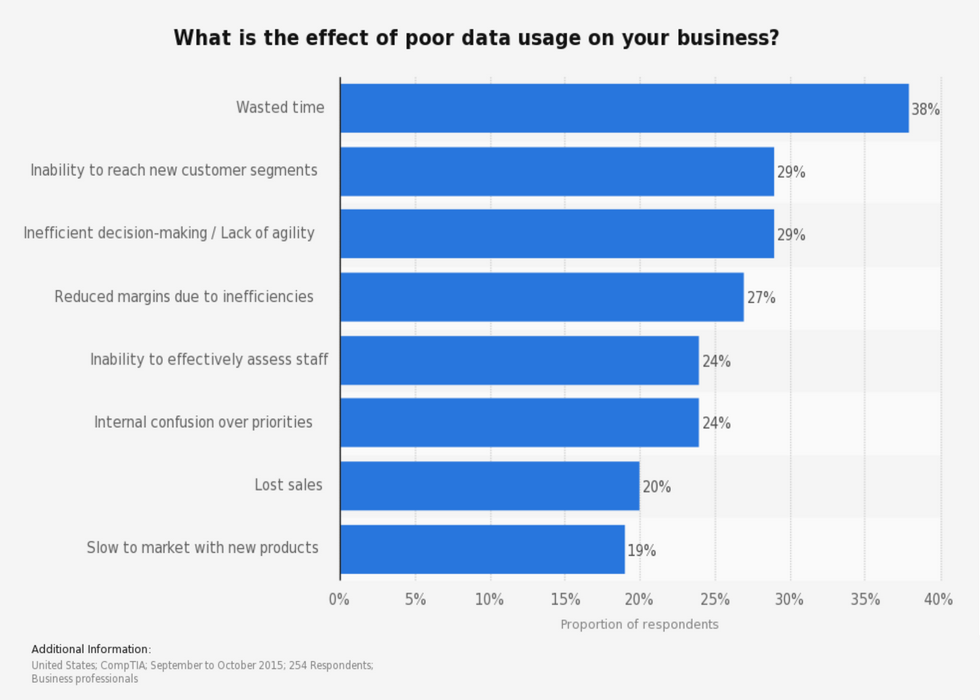
May 24, 2017
How to Build a Big Data Culture

Data has become a critical corporate asset for keeping a competitive edge in the market and making smarter decisions company-wide. In the NewVantage survey, 46.6% of executives express the view that their firm may be at risk of major disruption in the coming decade. As innovative technologies come on the scene, almost all companies are at risk to be overtaken by a disruptor. To guard against this risk, companies should strive to build a data culture. A data culture is a workplace that consistently uses data for tactical and strategic decision-making. It’s a company that does not rely on gut instinct, but rather on empirical proof.
Instead of using data as a reactive tool, it should be used as a decision-maker and combatant to industry disruption.
The amount of data companies collect on a daily basis is massive, but many businesses struggle to analyze and utilize this data. To tackle this dilemma, some organizations are hiring a Chief Data Officer (CDO). According to NewVantage Partners, 55.9% of firms surveyed hired a CDO; however, 56% of those firms see the role of the CDO as defensive and reactive in scope, rather than proactive and innovative. One function of the CDO role then becomes to foster a data-driven culture.
The Growth of the CDO Position
Creating a proactive culture based on data-driven decisions can stave off competition and make a company more productive and relevant to their buyers. Businesses need to make the active decision to build a data culture and recruit necessary talent that can help drive this initiative. Furthermore, they must onboard appropriate technology and platforms to allow employees to access, share, and use data.
 Once the technology and talent is in place, organizations have the foundation to begin building a data culture that drives tangible business outcomes.
Once the technology and talent is in place, organizations have the foundation to begin building a data culture that drives tangible business outcomes.Culture is defined by the way that individuals, teams, and organizations make decisions every day. Here are five operating mechanisms that when they become a habit or instinct can drive a data community.
5 Best Practices for Business to Build a Data Culture
1. Start with Leadership
If leaders adopt certain cultural habits, it will have a trickle-down effect on the team. Leaders should make sure teams know what they are doing when it comes to data and that data-driven behaviors are clear amongst all employees. Leaders can encourage creativity and discovery through data, which will help build the culture around data. This is a mindset shift, not changing rules or regulations, but it’s the critical first step to a big data culture.
2. Diversify Teams
Diversity is a competitive advantage. Teams that are open to outside views and opinions from data experts will succeed. It’s important that assumptions are challenged, competing hypotheses are vetted, and outside-in thinking becomes a daily ritual. Create new standards for team meetings, new communication methods, and initiatives that encourage different team members to mix. This will allow teams to move away from traditional thinking, opening their eyes to how data can help them perform better.
3. Connect End-to-End
Empower the frontline to effectively shift authority from the executive to the team. Three pieces must be combined here to form the fundamentals of a winning data culture: the scale of interactions with customers across the business, the experience of teams, and data. Employees must be able to challenge leaders and also learn how data builds a competitive edge to help create an open, data-driven company.
4. Connect and Share
Connectivity and sharing are central to a strong data culture. If a certain data insight improves business performance in one team, other relevant teams must also be informed. Leaders or team members who retain data for a “power play” will not succeed in this connected world. Instead, walls and boundaries must be broken down to encourage sharing and connectivity of data. Take steps to prevent the creation of new data silos within your organization to ensure that data gets “pushed” to the teams when and where they need it most.

5. Trust is Key
It all starts with trust. Teams should build trust with their data science colleagues, and both teams should challenge and debate issues. Data is not based on opinion or bias, just facts that teams can discuss to use to improve performance. This is where culture drives performance.
Creating a data culture does not mean completely reinventing your company culture — rather, it’s shifting the company value point. It’s moving from gut-based decisions to data-based decisions. As we turn into the data economy, leaders will need to build these cultural attributes into their teams to be successful. Combining the experience and knowledge of your leaders with big data every day is how a data culture can thrive.
 About the author: Graham Hogg is the founder and CEO of Connectworxs, an organization that informs data-driven decision-making by simply and consistently connecting business leaders to advanced analytics. Graham has spent the last 15 years helping leaders and teams anchor data into decision-making. Beginning his career as a Royal Marines Intelligence Officer, Graham then became a specialist in organizational development and transformation. For the past 7 years, he has been working with organizations and senior teams seeking growth including Anheuser-Busch, American Standard, Johnson & Johnson, Heineken, Grohe, and Diageo.
About the author: Graham Hogg is the founder and CEO of Connectworxs, an organization that informs data-driven decision-making by simply and consistently connecting business leaders to advanced analytics. Graham has spent the last 15 years helping leaders and teams anchor data into decision-making. Beginning his career as a Royal Marines Intelligence Officer, Graham then became a specialist in organizational development and transformation. For the past 7 years, he has been working with organizations and senior teams seeking growth including Anheuser-Busch, American Standard, Johnson & Johnson, Heineken, Grohe, and Diageo.





























